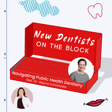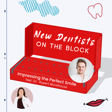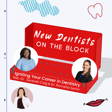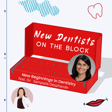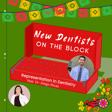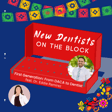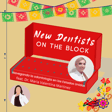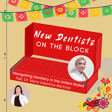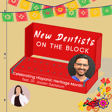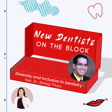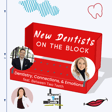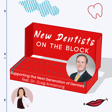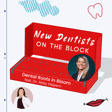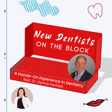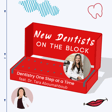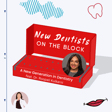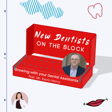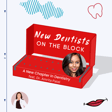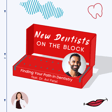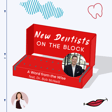Introduction and Guest Featuring
00:00:00
Speaker
Welcome to New Dentists on the Block, a podcast featuring new dentists sharing their experiences in the world of dentistry. Successes, challenges, and life in between, navigating dentistry together one experience at
Transition to In-home Dental Services
00:00:16
Speaker
In this episode, we have Dr. Ashley Robinson, a house call dentist and creator of the residential movement, a podcast turned community that empowers and equips dentists to begin offering in-home dental services to patients who are best served at home. Ashley and I had the opportunity to talk about her transition from working in a traditional dental setting to becoming a full-time house call dentist.
00:00:42
Speaker
This is definitely a different way to practice, but a very rewarding one and one that may interest our listeners. Let's tune in.
Personal Milestones of 2023
00:00:50
Speaker
Ashley Robinson, welcome to New Dennis on the Block. How are you doing today? I'm great. Thank you for having me. Thanks so much for making time to speak with me today. I'm so excited to be speaking with you.
00:01:02
Speaker
Right now when we're recording, it's the end of 2023, but when we will be listening to this, it'll be 2024, which is pretty surreal that we're starting another year and a new year. How is 2023 for you and are you ready for the year?
00:01:15
Speaker
Oh my gosh, that's a crazy question. 2023 for me has been a whirlwind. Like even personally this year, I got married, I have a new house, a new name, I have a dog for the first time. So that's been interesting. And then this also was the year that I made the transition to be a full-time self-employed dentist. So a lot has happened this year and I can't believe it's already almost 2024.
00:01:37
Speaker
I can't believe it either. And I'm so excited to delve into all those details. But 2023 was a huge year for you. Lots of changes. How was it for you? It was great. It was exciting. You know, I learned a lot throughout the year, went through to a lot of conferences, made a lot of great connections, felt like I grew as a leader and as a dentist. And I'm really excited to see what 2024 brings. And hopefully we'll continue to meet wonderful people like yourself and continue to go to a lot more CE events because those are always a lot of fun.
00:02:06
Speaker
Oh yeah. And I have a lot of those in my future.
Loyalty to Buffalo and Acomodental
00:02:09
Speaker
Awesome. Ashley, I would love if you would tell me and our listeners a little bit about yourself. Okay. Sure. I am a dentist who a 2019 grad. I'm very, very lucky that I was able to graduate a little bit before COVID before all the clinic rules had to change and everything like that. 2019 grad from Buffalo. I still practice in Buffalo.
00:02:27
Speaker
And I'm one of those born, raised, never leaving Buffalo kind of Buffalonians. And I love it here. I'm very loyal to the community here. And here is where I practice with my house call practice, a Commodental. Very cool. Yes. So I love Buffalo. First of all, people who went to Buffalo were amazing people to
Motivation for In-home Services
00:02:44
Speaker
me. And as I said, when I got to meet them, but I had the opportunity to go out to Ivaclar two years ago and just being, being around the people in Buffalo, like,
00:02:53
Speaker
So nice the kindness people so I hope to be back in Buffalo at some point Obviously not in the winter because it's miserable, but yeah because I really enjoyed just the area Really nice being up there Ashley I would love tell us a little bit more about the house call that you do and how you found out about that and how you got into it so I do house calls almost exclusively here unless I'm just trying to
00:03:21
Speaker
have fun and I'll pick up a chair side shift to fill in for somebody who's injured or something like that. But I'm a full-time house call dentist because when I was a resident here in Buffalo, I noticed in our local hospitals, we would see patients, especially patients who were bed bound, and we would tell them after they leave the hospital, follow up with your dentist. And I knew full well that they're not getting out of their house. They're not going to go follow up with their dentist. They're in their hospital bed. They're in a wheelchair, but maybe in a walk-up apartment. There's no way that they can get out, especially to go to the dentist for
00:03:48
Speaker
you know, routine exams and things like that. So when I noticed that need, I decided right then and there as a resident that I would pursue house call dentistry, even though I'd never heard of it, I'd never learned about it in school. Um, there aren't any other dental house call providers in my community. And I just did a little bit of research after a year of working full time in a community health center. I started going part time at my community health center and part time in private practices, because my business was getting busier and busier and now I'm doing it four days a week. So it's for patients who cannot leave the house.
00:04:18
Speaker
That's something that I have to mention when I say I'm a house call dentist because a lot of people just think, oh, great, come on over to my house when I'm free and you can clean my teeth or something. It's more for people who can't get out because there's so many Americans who would describe themselves as homebound or have limited mobility and they just can't get out. Transportation is really difficult. The physical outlay of a traditional clinic setting is really hard for them to navigate, getting into dental chairs and whatnot.
00:04:46
Speaker
There will always be people who cannot make it into the dental office and there should be more dentists who are available to meet their needs. Absolutely. That's a beautiful mission.
Residency Focus and Decision
00:04:54
Speaker
I want to backtrack real quick before we really take a dive into what all you do, but I would love to know why you decided to do a residency coming out of dental school. Thank you for asking. Yeah. Well, I'll start by saying in New York state, you don't really have a choice if you want to practice. Yeah, exactly. But I don't think that's a bad thing. I actually think it's a great thing.
00:05:15
Speaker
I probably would have elected to do it anyway, even if I had not had, you know, if I hadn't had to do it. Um, I wanted to become more familiar with medically complex patients. I became a dentist in the first place to treat patients who are medically complex or underserved in some way. So I knew a residency training would be necessary for me to do that. And also it was a huge confidence builder, like the skills that I left residency with versus what I left school with. I mean, I, I couldn't even imagine, like I was just such a different dentist after one year of a residency program.
00:05:43
Speaker
I'm really grateful I got to do that. Plus it was a year of learning things I'll never be able to learn again. You know, PGY1 and the hospital where I was required like an anesthesia rotation and a rotation through various departments of the hospital. And I just don't see the hospitals letting me go back in there now. Like if I said, excuse me, I want to go and witness this kind of surgery. They'd say, absolutely not. You're a dentist. Like, why are you here? But when you're a resident, you can get away with learning a lot of things. And it's a very, very cool time in your life that you can do that.
00:06:12
Speaker
How did you personally choose to do a GPR versus an AEGD? Good question. Here in my community where I was committed to staying, AEGDs are more focused on traditional private practice type of aesthetic procedures and things like that, like very routine, awesome, restorative dental care. GPRs here are more
00:06:35
Speaker
The GPRs offered in my community are offered in hospitals where you're seeing patients who are medically complex. You're doing a lot of trauma or patients who have cancer, patients who have special needs. You're working in long-term care in different and non-traditional settings. And I knew that that's where I wanted my career to go. So when you're looking to choose whether or not you should do a GPR or AEGD, I highly recommend doing one. But which one you do should be suited to the needs that you think you'll need in your own clinical practice when you get out.
FQHC Experience and Career Shift
00:07:03
Speaker
And how did you decide, did you know that you were going to practice at an FQHC coming out of your GPR? Or was that something that you decided when you were in the residency? So I knew during dental school that I wanted to work with particular patient populations. And I assumed in order to do that, that I would have to work at, in a hospital setting, in an FQHC setting. And that's kind of just, those are the options that are widely presented to dentists who have my interests during school. So I kind of just assumed that's where I'd end up. And during, you know, residency, I was able to negotiate that, that job.
00:07:34
Speaker
The funny thing was, is once I got there, I realized it wasn't quite for me, you know? So I was like, Oh no, what do I do? I'm a dentist with this desire to help a particular population, but I don't necessarily love the way that things operate there or are scheduled there or, um, how things, you know, work. So I was like, what am I going to do? I I'm a dentist who wants to serve people, but I don't think I'm, I'm not a great employee. Okay. I'll say that I'm not a great, um, FQHC employee. So I was like, this is not a good culture fit for me.
00:08:03
Speaker
Um, so what am I going to do? And that it was okay because I knew I was starting, starting my house hall practice. Would you feel comfortable, um, talking a little bit about the specifics that you didn't like about the FQHC, um, just maybe like the format in general, that wasn't for you, uh, just because obviously I'm at FQHC and I've had others who are at FQHC. So, you know, we've talked about, you know, the reasons that we love it, but I would love if we could kind of showcase some of the cons and the negative sides of what being at an FQHC can sometimes be like.
00:08:33
Speaker
Oh, yeah, absolutely. Because there were a lot of great things about it. But then I just realized, you know, for me, I was like, shoot, how come I can't, why can't I fit into this box here? So for the FQHCs that I worked in, I worked in two publicly funded dental centers. So one FQHC full time, and then once I was growing my business, I was in a different community center part time. So my experiences in both were that
00:08:57
Speaker
I always thought I wanted to never worry about numbers. Okay. When I was in dental school, I'm like, I don't want to talk about money. I don't want to talk about numbers or economics. I want to focus on patients. So well, how great is this that I get to be an employee at a health center and I never have to worry about money.
00:09:10
Speaker
And in my experience at the FQHC that was not, it was almost like I was worried about money all the time. They were like, if you want to keep our grant funding, we got to get butts in seats and patients through the door. And it was funny because I'm like, oh man, I think I talk about this stuff more at my FQHC than I did when I was, I was also working part time and private practice nights and weekends and stuff. So I'm like, I think I worry about this stuff more here because
00:09:32
Speaker
FQHCs obviously receive subsidized grants and government funding. So you guys, you have requirements you have to meet. You have to see certain number of people every day, which can sometimes translate into a very busy schedule for me.
00:09:43
Speaker
Um, and maybe better dentists than me excel in an environment like that, but I hate being rushed. I hate, um, you know, worried that there's someone tapping their toe in the waiting room for over an hour waiting for me. And I feel guilty about that because everyone's schedules, you know, I want to show respect for the patients. I don't want them. I don't want to be running behind and being double booked. So I realized really quickly that the overwhelm for me and the stress I was feeling, and I felt like I was being disrespectful with the way that the scheduling was working. So.
00:10:11
Speaker
Those are two things I think I didn't really love so much, just the high volume and the rushing that I feel like I experienced. And then the other thing I should say, and this is really unique to where I was working, but I remember requesting a day off. I asked for a Friday off in August or an August Friday, but I asked in March. And I remember in March, the response for my boss being,
00:10:33
Speaker
Yeah, we'll see about that." And I'm like, wait a minute. This is month's notice for Friday and August. I'm not actually asking you. I'm kind of just telling you that I'm not going to be there that day. So just don't book me. I was so confused. Because even as a resident, we'd receive more respect. Even in residency, we were told that just let us know when you need off and we won't book you patients that day. Because luckily, when you're a dentist, that's how it kind of goes. You just don't need to be there. You just tell patients not to come in that day.
00:10:58
Speaker
I remember certain things like that where I was like, I can't be an employee here for my entire career. These are not things I can tolerate forever. I knew I would need a change. Yeah. I've mentioned in other episodes that not all FQHCs are made alike, but these are very real realities at many FQHCs.
00:11:16
Speaker
Um, there are many, many of them are encounter based. We're encounter based here. And so it is really important for us to be busy. And I'm right there with you. I don't like to be rushed. I like to use my rubber dam. I like to take my time. Um, but you know, sometimes you do run over time and you learn ways to fix your schedule. So that way you can balance that out. Uh, but sometimes some FQHCs they push that push down so that, that can be very challenging and yeah, you gotta go. Well, there's a need. I mean, yeah.
00:11:42
Speaker
There are very few places near me, at least, that accept certain state-sponsored insurances. There are backlogs, and we need to see as many people as possible. Yes, for funding purposes. Also, just because there's the demand. So many patients need to get in. So many patients are behind on their routine recall. So I get it. I understand everything that they're up against. And I just felt kind of powerless in that situation. And I felt like there are other dentists who might be better suited to tackle those challenges.
00:12:09
Speaker
Even my best work, I love to do my best work and I have to take my time. And so other people are able to do beautiful work in no time at all. So it's definitely finding a fit. It's not that anything's wrong with any setting, it's like you got to find where you fit in.
00:12:25
Speaker
Yeah, regardless of the practice setting, finding that right fit I think is so key. I'm glad that you stated that. So when you were at the FQHC, you were starting to get ready to, you know, open your business.
Starting a House Call Practice
00:12:37
Speaker
What steps did you take before, you know, you made that hard launch of going all in?
00:12:45
Speaker
So I wish I could say it was a hard launch, but it wasn't. It was, um, luckily my full-time position at the FQHC was within four days. So I had one day a week where I could, you know, I was working in private practice for additional experience. And then I was able to still maintain my full-time job and begin my practice one day a week. So, um, I did do that and slowly grew it over time. But even before seeing my very first patient, you have to make sure that you, you know, check out, like you've talked to an accountant and a lawyer, figure out like basic business things. These are things I did not know.
00:13:14
Speaker
I didn't really learn much business, I would say, before beginning a business. So I had to learn those things. I wanted to make sure I was compliant with all the regulations and I had all my business bank accounts set up and things like that. Ordering, I would think through the procedures that I wanted to offer in my house call service and make sure that I order the correct materials because I didn't want to show up to someone's house and promise that I could deliver. Sure, let's do this denture and then realize I don't have impression material or something like that. So just taking a lot of inventory,
00:13:42
Speaker
making sure I knew what I wanted to offer, how I wanted to do this. And I did a little bit of research about the need in my community, not so much the demand because nobody was demanding it because no one even knew that it would exist. But I was kind of looking into my region and like the average age of people or what different conditions are really prominent here. And just spreading the word to different people like, hey, I know that you probably work
00:14:03
Speaker
in an organization with a lot of patients who could benefit from these services, put the feelers out, let me know if that's something that they'd be interested in or not. And yeah, and that's how I acquired my
00:14:13
Speaker
my first couple of patients. But when I started doing house calls, I was, like I said, I never wanted to discuss business or money or anything. And I ended up charging $0 for my first three appointments. And I realized like, I'm going to go broke pretty quick. I'm not going to be able to offer the service at all unless I kind of learn how to do that. So I would say becoming a practice owner or a business person really came later because it just began with wanting to offer dental services. And then now I figured out some economic things that I didn't really know before.
00:14:42
Speaker
But it took time. Yeah, I hear you. You know, I'm not the mini person and I definitely don't know enough about business to do any of that. So I pray I stay here for a really long time. But you mentioned that you put up feelers. Who did you reach out to? Who did you send those feelers to? Were they like nursing homes or assisted living homes or some other? So I generally don't I I don't contract with any like like community care center or facility in general.
00:15:12
Speaker
I work with individual patients. So I might get called to come visit someone's loved one who lives in a community, but I was talking mostly, you know, I let my old, like some of my professors know some of my residency directors and faculty and say, Hey, what do you guys think about this? Um, but yes, hospice, VNA, social workers who have people who that they know are, you know, in the home meals on wheels, organizations like that, people who are already visiting people who can't get out of the house and just let them know that this, this would be coming. And once it was coming, just let them know I was active.
00:15:42
Speaker
and available to them. What are some of the procedures or what would you say the majority procedure that you do on a daily basis? Well, in New York, the laws are a little bit different here. So I, I need to do my own hygiene because we need to be in the same physical location as hygienists. So I do a ton of my own recall. And so that's always, always keeping me busy at the minimum, but then beyond recall and exams, we do a lot of,
00:16:11
Speaker
You know, I'm offering x-rays during these exams. Like they're, you know, very like comprehensive exams and recalls, but then we do extractions frequently dentures, dentures adjustments, restorations. Um, yeah, I'd say extractions, dentures, restorations and, and exams.
Logistics of House Call Dentistry
00:16:28
Speaker
How do you, um, how do you take x-rays and process them? I bring a laptop with a digital laptop, a sensor and, um, like a, a gen array it's called.
00:16:41
Speaker
Okay. How do you do your serialization? I, so the first year, because like I said, I wasn't really, I wanted to grow this nice and slow. My very good friend, um, who was actually a former boss of mine, he gave me the keys to his office. He said, use my place at nights and weekends to sterilize your instruments. And I was like, Oh my goodness. That's so nice of you. Thank you so much. And now I just have an in-home autoclave. So, um, I have an in-home office where I store all my equipment, do my paperwork and send out my referrals from and everything else. And that's, you know, where I do it now.
00:17:11
Speaker
But yeah, that's something that I didn't even know how to do. New dentists probably don't even know how to sterilize. I had to ask my assistant to show me at work, because when would I have learned that? Yeah, yeah, yeah. I definitely learned here at the FQRC just because there's a lot of steps and a lot of logs that we have to keep. But yeah, I wouldn't have been able to tell you coming out of dental school for sure. Actually, how many days a week do you work?
00:17:35
Speaker
Currently I would love to say four because I do work four, but then sometimes because I have such flexibility with my schedule, if there are people who like right now there's a woman in town, her wrist is broken. She was playing pickleball really aggressively. And so she said, you're filling in here. I said, I can't fill in. I'm really busy with my house calls, but she has hours where she's open into the late evenings or early mornings sometimes.
00:17:57
Speaker
And I said, you know, I can help you out in those hours when I'm not doing house calls. So, um, I should be working for, I probably work a little bit more than that just because yeah, just wouldn't I have to fill in for people or if I'm trying to be useful or they pick up a, an urgent care shift and urgent dental center in my community just for fun. But my services are offered four days a week and I'll be honest, like they're physically tough. So I think in the future I've had some dentists here reach out that they might want to help out one day a week or so. And I think that might be great because
00:18:26
Speaker
beyond like physically having to bend over patients who are in their hospital bed or wheelchair, you have to log all of that equipment around. So you're setting up and you're cleaning up and you're putting things in your car, taking things out of your car. So I think physically doing house calls three days a week is probably more sustainable, but right now I'm doing them four.
00:18:48
Speaker
If you were to transition to three days a week, would you want to keep just doing dentistry three days a week in this way? Or would you want, would you look into maybe doing something else in addition to the house calls?
00:19:00
Speaker
I could see myself in other roles, maybe teaching or spreading the word about this type of need and industry, something like that, or even just administrative work within my business. If I'm not offering house calls directly, what I don't want to do is end up in a traditional practice setting, only because I feel like that's not where I'm best serving anybody. Most dentists are trying to do that.
00:19:27
Speaker
I love it and I enjoy doing it occasionally, but I never want people to get confused. Let's say I became an associate a day a week in someone else's office. They might say, oh, can you just do my next cleaning at my house? Then I have to explain, no, this is not what that's for. I'd rather be dedicated to this mission of spreading the word about this need and this field than muddying the waters.
00:19:49
Speaker
But I mean, that doesn't, like I said, I can fill in for people who need me if they need help chair side for a little while. But yeah, I think if I were to do three days a week of clinical dentistry, the other two days would be spent in a more educational or administrative way. It's actually such a beautiful mission. I hope that you know that you're doing a lot of good for your community. And I hope that others will be inspired by you to also, you know, take on a similar mission. I think that's awesome.
00:20:13
Speaker
Um, are, are you the only one in your community doing something like this or have others, you know, started something similar?
Community Role and Unique Service
00:20:20
Speaker
So I'm the only house called dentist in the area. Every, um,
00:20:24
Speaker
community, like every senior resident community, they have a dentist who visits maybe once a month, but I think most of those dentists have private practices and they just hop in once a month to visit. But I'm the only one that will go into private homes in my community. And I honestly, before I started doing it, I had never even heard of it in my community. And most people hadn't either, even to this day, two years later, when I tell people that I'm a house call dentist, they're like, what? Who? Some people want someone does that? Like that's possible. And I know that sounds funny because I have friends from New York City
00:20:54
Speaker
who, you know, they grew up in Queens or they grew up in Long Island and they're living in Manhattan and there's a ton of house call dentists down there. And it's, there's a ton of house call dentists in areas like San Francisco or in California, because I think like anything else in more affluent communities, things pop up and then they work their way into, you know, middle whatever. So I think it's becoming more common. It's just not very well known.
00:21:15
Speaker
But yeah, in my community, we certainly didn't have this available. And so I do feel obligated to beyond doing the direct patient care, I feel obligated to grow it like beyond myself, because someday I'm going to need someone to take care of my teeth. And we're going to want there to be other house called dentists in the area. So we do have some mobile dentistry available here, you know, with the use of mobile buses and mobile vans and things like that. But I try to say like, I'm a house called dentist, not a mobile dentist, because the patient populations are different.
00:21:43
Speaker
We have some mobile providers here. They can park outside of a bank downtown and do a bunch of recalls for people on their lunch break. My patients could never get into a van. So it's a completely different model and a little bit of a different need, although they both kind of sound like mobile dentistry.
Insurance Decisions and Financial Viability
00:22:01
Speaker
I'd like to go back to the numbers if we can. Yeah. My first question to you is, do you accept insurances?
00:22:10
Speaker
I do not directly participate or accept any insurances, which is so funny coming from a public health background where I sort of wanted to help everybody. And I like, I really thought that would be great. And then I realized like what an impediment me participating with that would have, I couldn't sustain the business. It wouldn't happen. Um, these insurances, most insurances hardly cover traditional dental services, let alone house called dental services or the additional time required to see a patient. So in an FQHC or in a traditional setting,
00:22:38
Speaker
you can see many, many patients at once. You can have really high volume. And in that case, economically, of course, in some insurance reimbursement with additional state funding, that can sustain the business. But for me, I'm visiting three people a day, maybe four. And I might be doing low procedures like recalls. And so I don't have the ability to have multiple hygiene units going and a lot of people in and out or getting someone else numb in the other room. It's a very low volume, inefficient,
00:23:08
Speaker
time, you know, it takes a lot of time to do these things. So the only way I can do it is by paying someone like they are one of three people that I see or, you know, charging someone that way. So, um, it took me a long time to come to terms with that, but yeah, so right now it's not a very, it's not a widely affordable thing. It's not something that is covered by insurances, but like everything else, I think we have to start somewhere and we have to show insurance companies and we have to show systems that this is a demanded service that needs to be covered. And the more people who gladly
00:23:38
Speaker
use it now, that'll pave the way for people who want to be using it now who can't, who might go back to their insurance company and complain. Like, hey, how come you guys won't cover the additional house coffee? And it needs to first become widely available and widely known. Then it will be a traditionally covered service in the future, I think. I think that's the goal here.
00:24:01
Speaker
I know that you do this because you see the need in your community, but if somebody, you know, we're listening to this episode and is curious about if, you know, they could do this full time and sustain, you know, their lifestyle, their family, would you say that that's something that's possible?
00:24:19
Speaker
Oh yeah. Well, cause that's, I mean, that's what I do. Like I want to see patients and everything and I care about the mission, but I could never do it. I mean, I have bills too. I came out with student loans like everyone else. So I couldn't do it unless I were earning a competitive dental wage, doing it now. So absolutely. Um, the trick is you can earn as much or little as you want. It's just, it's making sure you do it often enough and you charge what you have to charge to do it. So that's what keeps it sustainable.
00:24:43
Speaker
Um, some good things are, although I don't get to see a lot of patients every day, I'm also not using as much material every day. I don't have a building to heat. I don't have staff to pay. I don't have all the overhead that comes with, right. So my business actually, if a traditional dental office runs and let's say it's like 50 or 60% overhead, my business is like 35% overhead. You know, I haven't, I have one virtual assistant.
00:25:05
Speaker
Everything that I do is in my own personal residence and it's a low volume type of business. So I don't necessarily have all the expenses other people do. So I'd say it's almost easier to earn a living like this when you have so much control over your schedule and what you're spending and what you're using. So it's definitely a lucrative lifestyle for people who are interested and more flexible too. Yeah, I love the flexibility.
00:25:30
Speaker
If you need, if you need that Friday off, you know, six months from now, you're going to take that Friday off. I don't have to ask a single person. Exactly. You're, you're your own boss and you can, um, make things work around your schedule. Um, do you find yourself driving long distances to see some patients? Yeah. So I, when I started this, I never thought that that would be the case, but my first patient, and I call them a stranger patient that I ever had, I've had patients who were, you know, like friends of family to kind of in the beginning, but once
00:26:00
Speaker
We had our first patient call who I had never personally met. And that person lives 90 minutes away.
00:26:06
Speaker
And I was like, how did they even get this phone number? But it's because there's just, like I said, there aren't any other providers here. I get phone calls from people who live four hours away from me from Albany, New York, wondering if I'll come. And I won't because it's just, I explained like, I'm sorry, that would be the entire day. Um, but I will, I'll drive as far, um, about 90 minutes in a 90 minute radius from where I live usually. And I know that there are phone calls coming in from even farther away, but we explained to them like, I just, I wish like, you know, I wish I could, I don't think I will allow it or, um,
00:26:36
Speaker
I don't think that our travel fee would recover. I don't know. It's just like, I know that the need is everywhere. I wish I could be everywhere, but where I turn, I do end up taking a lot of trips about 60 or 90 minutes away multiple times a month. Yeah. The need is, the need is everywhere, right? Yep. I know that probably it's sometimes difficult to say no, but you, I'm sure you make it work where you can and when you can. Absolutely. Yeah. That's getting learned to say no is something I had to really get really good, get really good at.
00:27:04
Speaker
Yeah, yeah, yeah. Yes, that's huge, but you also mentioned that, you know, your first three patients, you didn't charge them anything. That's where I would be. I would be right there with you. You know, that's, that's tough. One woman, she was no funny. And these are, they're mostly at home because they have medical issues, right? Like they're not seeing perfectly healthy people in their houses. So one of my patients, she was wheeling around and she goes, so I just got back from the hospital and my bill is this much, my physical therapist just left and they want this much. So how much do I owe you now?
00:27:31
Speaker
And I was like, Oh, nothing, nothing. It's on the house. It's fine. Just take it. And like, that was my, I think that was my second patient. And I was like, Oh gosh, like this is going to be terrible. Cause you, you feel like you're at it. I mean, these people have so many medical expenses. Um, yeah, it's, it's hard, you know, dentistry is hard just in general. Um, obviously we're from public health backgrounds. So we, we get that. Uh, it's just tough, but that's great what you're doing. And you mentioned briefly that you have a virtual assistant.
00:27:59
Speaker
What is it? And do you have an assistant that travels with you as well? Good question. No, I don't have an assistant who travels with me only because again, like overhead and flexibility. So I love to be able to stop off at the store or the bank or wherever I need to go and not worry about someone else's like schedule with me throughout the day.
00:28:16
Speaker
And when you're working at such a slow pace, you really don't need an assistant. And a lot of the procedures I'm doing are quite simple. I'm used to working without an assistant from my training. And so I just kind of kept going with it. So I don't have an assistant with me when I'm going place to place, but I do have a virtual assistant who is at home, who takes my phone calls and she schedules my patients. She sends out referrals and things like that. So, um, cool. She's not living. That's probably really helpful. Yeah. Oh, it's so helpful. And I needed it from the start because I was working full time. So I knew if I got the phone number out there.
00:28:46
Speaker
But I was working 40 hours a week somewhere else. I wouldn't be answering the phone and I was like, that's not good. So at the very least, um, somebody to do the administrative things like emailing and, and things like that, because I just, I can't, I'm not in front of my computer. You know, I have to write my notes at the end of the day when I get back home. So I'm out on the road so much. It just, I couldn't also be like the office manager too.
00:29:08
Speaker
Yes. Yeah. I'm sure that that virtual assistant is so helpful to you and can do things on the backend that would save you time from, you know, having to come home and do all of that on top of, you know, writing your notes and living life. Yeah, because it's a house call then as you're doing, you know, I mentioned like, I don't have an assistant that I travel with, so I'm doing a lot of the things an assistant would do throughout the day. It sounds silly, but just like the cleanup sometimes takes forever when I'm at someone's home.
00:29:33
Speaker
And a cleanup, that's a huge way assistance save time for doctors and FQHC settings. Like that's, that's a big deal. And then when I come home, like my sterilizing too. So I'm already doing so many things that most dentists don't do every day that my virtual assistant, the more that she can help me, like she is such a godsend really she is because she helps me with a lot of things. Um, cause I already feel like we have as a house called Dennis, like we have a little bit of a wider role here. Right. Yes, absolutely.
Advice for New Dentists
00:30:01
Speaker
Ashley, if you could provide some advice for new dentists, what would that advice be? My advice to new dentists would be avoid the traps because it's very easy for new dentists to become trapped in whatever they decide to do out of school, whether it is the idea that you're married to a position because you're trapped there because you want to stay there for loan forgiveness. You're trapped to a new practice because you financed it and it's a 30 year term and now you have to go to work every day, five days a week for eight hours for the next 30 years.
00:30:30
Speaker
avoid trapping yourself in a position where you don't feel free. You don't feel free to leave or change or do what you need to do. Because at the end of the day, you need to work in an environment that you enjoy. You need to be able to have the flexibility to spend the time the way you want to, because our time is our most valuable asset. And just make sure that you don't sign anything that you aren't positive you'll be happy with. Don't commit to a lifestyle that you don't enjoy. New dentists, I think, acquire a lot of burnout or
00:30:59
Speaker
feel obligated to certain things and really their agreements that they made. And it's like, you didn't have to find yourself in that position. Just create a lifestyle that you think you can sustain. Very well said. If our listeners would like to connect with you or would like to learn more about Housecall dentistry, what's the best way?
00:31:17
Speaker
tell them to visit me at residentialmovement.com. And I know that's like a mouthful. It's resident, residential instead of residential, if you can imagine. So residentialmovement.com. Cause they're all have some resources like I have blog posts and links to different podcasts, episodes that answer some different questions people might have about how it's called dentistry in general. So the residentialmovement.com website is the best place to get more info and also reach out to me. Very well, actually any less thoughts for our episode today?
00:31:45
Speaker
No, I'm really grateful that you and I got the chance to get together. Cause I just, I'm really happy we got to talk. I know you're so busy and you have a lot going on and, um, yeah, I'm happy that we got to meet. I'm so happy that we got to meet as well too. And I'm super intrigued and I know that others are going to be super intrigued as well too, after listening to this episode. So Ashley happy holidays. We will listen to this episode in the new year and hopefully we will cross paths in the new year as well too. I can't wait. Thanks for your time. Thank you.
Engagement and Podcast Details
00:32:12
Speaker
Thanks for tuning into this episode of New Dentists on the Block. If you'd like to connect with Ashley, you can find her on Instagram on several different pages, including Residental Movement, Accomodental, and Ashley.m.Robinson.
00:32:27
Speaker
Be sure to check out her websites acomodental.com and residentalmovement.com. Make sure you stop by and congratulate her on recently welcoming a beautiful baby girl. Please be sure to subscribe to the podcast on YouTube and on all major podcast platforms. We'll catch you next time.

